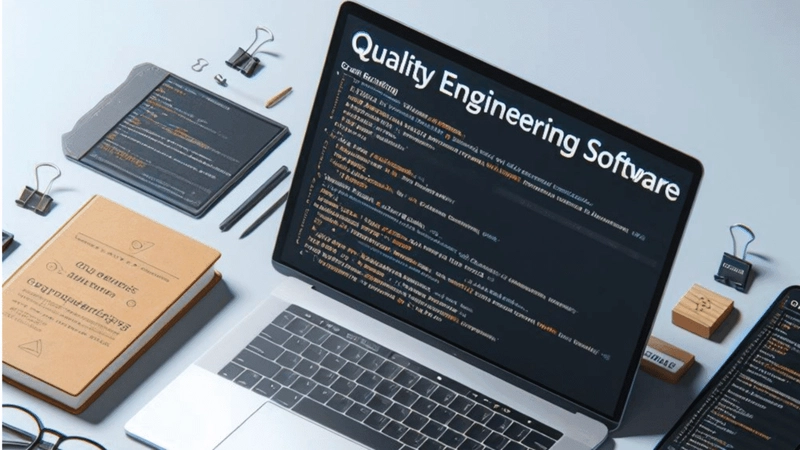What is a Quality Engineer? Roles, Responsibilities, and Skills
Introduction Quality is at the heart of any successful product or process—and the person responsible for ensuring this quality is often a Quality Engineer. Whether it’s in manufacturing, software development, or service delivery, Quality Engineers play a vital role in making sure everything meets high standards. What is a Quality Engineer? A Quality Engineer (QE) is a professional focused on maintaining and improving the quality of products, services, and processes. They are responsible for identifying issues, implementing solutions, and ensuring that both production and final outcomes align with company and customer expectations. In essence, they bridge the gap between production and perfection. Key Responsibilities of a Quality Engineer Quality Engineers wear many hats, and their responsibilities can vary depending on the industry. Common tasks include: Designing and implementing quality assurance protocols Monitoring production lines or development workflows Investigating product failures and recommending improvements Conducting audits and inspections Collaborating with cross-functional teams to optimize processes They aim to reduce errors, save costs, and maintain a consistent level of excellence across the board. Types of Quality Engineers Depending on the industry and role, QEs can specialize in different areas: Manufacturing Quality Engineers – Focus on assembly lines, physical products, and factory processes Software Quality Engineers – Test applications, automate test cases, and ensure digital systems are bug-free Mechanical or Industrial QEs – Concentrate on machinery performance and process optimization Process Quality Engineers – Monitor and improve internal workflows and standard operating procedures Each specialization requires domain-specific knowledge, but all share a common goal: continuous quality improvement. Skills Required to Become a Quality Engineer Being a successful QE requires a blend of technical and soft skills: Analytical thinking – For troubleshooting defects and root cause analysis Attention to detail – Small mistakes can lead to big consequences Knowledge of QA tools and methodologies – From Six Sigma to Agile QA practices Communication and teamwork – Collaboration is key when resolving issues across departments Understanding of standards and compliance – Including ISO 9001, FDA regulations, or industry-specific certifications Quality Engineers must also be comfortable working with data, identifying trends, and proposing data-driven improvements. Tools and Technologies Used by Quality Engineers Depending on the environment, QEs rely on various tools to streamline their tasks. These might include: Software Testing Tools – Selenium, JUnit, Postman, or Keploy (for AI-powered API test automation) Data Analysis Tools – Excel, Minitab, or statistical process control (SPC) software Issue Tracking Systems – JIRA, Bugzilla, or Trello Automation and CI/CD Tools – Jenkins, GitLab CI, or CircleCI These tools help improve testing efficiency, automate quality checks, and monitor performance metrics in real time. Quality Engineer vs. Quality Assurance Engineer Although often used interchangeably, there is a subtle distinction: A Quality Engineer is process-focused, aiming to build quality into every step of the workflow A Quality Assurance Engineer often focuses on testing the final output, particularly in software, to ensure it meets functional and user expectations Both roles are essential, but Quality Engineers tend to have a broader, systems-oriented perspective. The Role of a Quality Engineer in Agile and DevOps In Agile and DevOps environments, QEs must adapt to rapid iteration and continuous delivery. They contribute by: Embedding quality checks within CI/CD pipelines Creating automated tests for real-time feedback Collaborating with developers during sprint planning Ensuring test coverage throughout the development lifecycle The goal is to “shift left” and catch issues early—before they become costly problems. Certifications and Career Path To advance in the field, professionals often pursue certifications such as: CQE (Certified Quality Engineer) – Offered by ASQ (American Society for Quality) ISTQB (International Software Testing Qualifications Board) – For software testing professionals Lean Six Sigma Green/Black Belt – For process improvement and statistical control As for career growth, QEs can move into roles such as Quality Managers, Compliance Officers, or even CTOs in tech-driven organizations. Why Companies Need Quality Engineers The value of a Quality Engineer extends beyond just finding bugs or defects. Companies rely on them to: Ensure regulatory compliance Improve product reliability Enhance customer satisfaction Reduce rework and waste Drive innovation in quality processes In industries like healthcare, finance, and manufacturing, the role is critical to brand reputation and operational excellence.

Introduction
Quality is at the heart of any successful product or process—and the person responsible for ensuring this quality is often a Quality Engineer. Whether it’s in manufacturing, software development, or service delivery, Quality Engineers play a vital role in making sure everything meets high standards.
A Quality Engineer (QE) is a professional focused on maintaining and improving the quality of products, services, and processes. They are responsible for identifying issues, implementing solutions, and ensuring that both production and final outcomes align with company and customer expectations. In essence, they bridge the gap between production and perfection.
Key Responsibilities of a Quality Engineer
Quality Engineers wear many hats, and their responsibilities can vary depending on the industry. Common tasks include:
- Designing and implementing quality assurance protocols
- Monitoring production lines or development workflows
- Investigating product failures and recommending improvements
- Conducting audits and inspections
- Collaborating with cross-functional teams to optimize processes
They aim to reduce errors, save costs, and maintain a consistent level of excellence across the board.
Types of Quality Engineers
Depending on the industry and role, QEs can specialize in different areas:
- Manufacturing Quality Engineers – Focus on assembly lines, physical products, and factory processes
- Software Quality Engineers – Test applications, automate test cases, and ensure digital systems are bug-free
- Mechanical or Industrial QEs – Concentrate on machinery performance and process optimization
- Process Quality Engineers – Monitor and improve internal workflows and standard operating procedures
Each specialization requires domain-specific knowledge, but all share a common goal: continuous quality improvement.
Skills Required to Become a Quality Engineer
Being a successful QE requires a blend of technical and soft skills:
- Analytical thinking – For troubleshooting defects and root cause analysis
- Attention to detail – Small mistakes can lead to big consequences
- Knowledge of QA tools and methodologies – From Six Sigma to Agile QA practices
- Communication and teamwork – Collaboration is key when resolving issues across departments
- Understanding of standards and compliance – Including ISO 9001, FDA regulations, or industry-specific certifications
Quality Engineers must also be comfortable working with data, identifying trends, and proposing data-driven improvements.
Tools and Technologies Used by Quality Engineers
Depending on the environment, QEs rely on various tools to streamline their tasks. These might include:
- Software Testing Tools – Selenium, JUnit, Postman, or Keploy (for AI-powered API test automation)
- Data Analysis Tools – Excel, Minitab, or statistical process control (SPC) software
- Issue Tracking Systems – JIRA, Bugzilla, or Trello
- Automation and CI/CD Tools – Jenkins, GitLab CI, or CircleCI
These tools help improve testing efficiency, automate quality checks, and monitor performance metrics in real time.
Quality Engineer vs. Quality Assurance Engineer
Although often used interchangeably, there is a subtle distinction:
- A Quality Engineer is process-focused, aiming to build quality into every step of the workflow
- A Quality Assurance Engineer often focuses on testing the final output, particularly in software, to ensure it meets functional and user expectations
Both roles are essential, but Quality Engineers tend to have a broader, systems-oriented perspective.
The Role of a Quality Engineer in Agile and DevOps
In Agile and DevOps environments, QEs must adapt to rapid iteration and continuous delivery. They contribute by:
- Embedding quality checks within CI/CD pipelines
- Creating automated tests for real-time feedback
- Collaborating with developers during sprint planning
- Ensuring test coverage throughout the development lifecycle
The goal is to “shift left” and catch issues early—before they become costly problems.
Certifications and Career Path
To advance in the field, professionals often pursue certifications such as:
- CQE (Certified Quality Engineer) – Offered by ASQ (American Society for Quality)
- ISTQB (International Software Testing Qualifications Board) – For software testing professionals
- Lean Six Sigma Green/Black Belt – For process improvement and statistical control
As for career growth, QEs can move into roles such as Quality Managers, Compliance Officers, or even CTOs in tech-driven organizations.
Why Companies Need Quality Engineers
The value of a Quality Engineer extends beyond just finding bugs or defects. Companies rely on them to:
- Ensure regulatory compliance
- Improve product reliability
- Enhance customer satisfaction
- Reduce rework and waste
- Drive innovation in quality processes
In industries like healthcare, finance, and manufacturing, the role is critical to brand reputation and operational excellence.
Conclusion
A Quality Engineer isn’t just a tester—they’re a proactive, strategic contributor who ensures that quality is embedded into every part of a product or process. From reducing production defects to automating software testing, QEs help teams deliver excellence consistently. As industries continue to evolve, the need for talented Quality Engineers will only grow stronger.











































































































































































![[The AI Show Episode 142]: ChatGPT’s New Image Generator, Studio Ghibli Craze and Backlash, Gemini 2.5, OpenAI Academy, 4o Updates, Vibe Marketing & xAI Acquires X](https://www.marketingaiinstitute.com/hubfs/ep%20142%20cover.png)




























































































































![[DEALS] The Premium Learn to Code Certification Bundle (97% off) & Other Deals Up To 98% Off – Offers End Soon!](https://www.javacodegeeks.com/wp-content/uploads/2012/12/jcg-logo.jpg)


![From drop-out to software architect with Jason Lengstorf [Podcast #167]](https://cdn.hashnode.com/res/hashnode/image/upload/v1743796461357/f3d19cd7-e6f5-4d7c-8bfc-eb974bc8da68.png?#)








































































































.png?#)

































_Christophe_Coat_Alamy.jpg?#)
 (1).webp?#)





































































































![Apple Considers Delaying Smart Home Hub Until 2026 [Gurman]](https://www.iclarified.com/images/news/96946/96946/96946-640.jpg)
![iPhone 17 Pro Won't Feature Two-Toned Back [Gurman]](https://www.iclarified.com/images/news/96944/96944/96944-640.jpg)
![Tariffs Threaten Apple's $999 iPhone Price Point in the U.S. [Gurman]](https://www.iclarified.com/images/news/96943/96943/96943-640.jpg)




































































































































